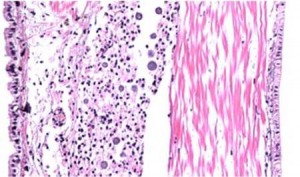Genome-assisted selection of hard clams for resistance towards disease and environmental stress

QPX cells (dark spheres) in clam mantle tissues. QPX disease remains the most significant infection affecting the hard clam in the Northeastern US.
The hard clam or northern quahog, Mercenaria mercenaria, is one of the most valuable seafood products in the Northeast representing the first marine resource in several states. Since the 1990’s, several Northeastern states have suffered severe losses in aquacultured hard clam stocks due to a fatal disease caused by a protistan parasite called Quahog Parasite Unknown (QPX). The extensive scale of these mortality events resulted in the loss of several dozens of Millions of aquacultured market-size clams and significant impact on aquaculture operations. In parallel, growers in southern states (e.g., Florida) regularly report large scale mortality events in market size clams as a result of severe heat waves. Previous work demonstrated that clam resistance to these stressors is genetically dictated. Therefore, we have been using different approaches to understand clam responses to these stressors, and to identify superior clam lines. Our overall objective in this research area is to employ modern genomic tools (e.g., RADSeq, SNP Arrays, genomic selection) to provide the commercial aquaculture industry with improved clam stocks. Our previous research in this area was supported by the USDA while current funding derives from NOAA (our current project is described at http://www.hardclamhub.org). The selection for resistant clam strains would allow the development and expansion of the hard clam aquaculture industry. Information on genetic variation in clam broodstocks as related to resistance and growth will be widely diffused through our robust extension and outreach plan providing direct benefits to shellfish breeders and farmers. The growth of shellfish aquaculture can provide ecologically sustainable economic growth in coastal communities and decrease pressure on over-exploited capture fisheries.




